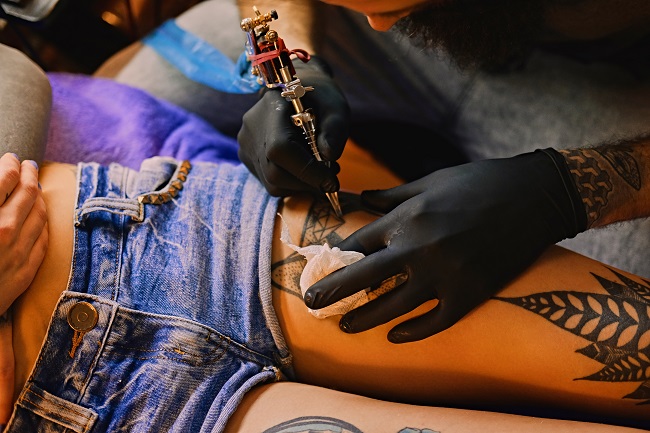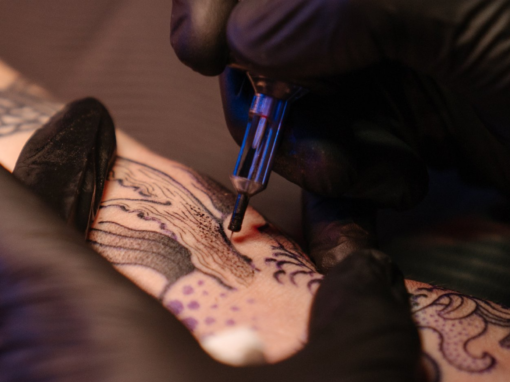Tattoo artistry is a unique and rewarding profession that transforms creative passion into permanent body art. The mastery of a tattoo artist ensures that every ink piece they create holds deep personal meaning and looks stunning, too. Yet, achieving this level is not a trivial task, which is why we wanted to discuss what you need to become a tattoo artist.
In this article, you will learn what kind of skills you need to master, the tattoo artist education you have to get to obtain a professional license in different states, and some statistics relevant to your future career.
The Profession of a Tattoo Artist

Before you make a defining career choice and start the tattoo artist education process, it is important to get an understanding of your future job responsibilities. So, here are the three categories of essential tasks you’ll need to perform in a tattoo shop.
✒️ Tattoo application
This is probably the first aspect you imagine when thinking about the duties of a tattoo artist. A large part of working in a tattoo shop is knowing how to use a tattoo machine to perform designs in various styles and techniques. Learning these techniques is definitely going to be a part of a tattoo artist’s job responsibilities, however, it is not the only aspect you’ll need to master.
✒️ Design creation
As a tattoo artist, your duties include producing sketches and adjusting designs based on client feedback, taking into consideration their preferences, ideas, and body placement. In reality, this means a lot of drawing practice in preparation for a client’s visit.
✒️ Maintaining a sterile environment
Another essential task before an aspiring tattoo artist is keeping the workplace clean and safe. A client coming to a tattoo shop entrusts you with their health, and an artist must know how to maintain high safety standards. Therefore, being an ink professional goes beyond the individual’s creativity and passion—it also requires meticulous preparation and impeccable professionalism.
Some aspects of a tattoo artist’s education will require formal proof of completion, so let’s now talk about what kinds of certification you need to become a tattoo artist in different states and where you can get the mandatory training.
What Education Does a Tattoo Artist Require To Get a License?

The health codes differ significantly between states. Actually, not all states even require a tattoo artist to have a specific license to start working. For example, Arizona is one state that doesn’t regulate the industry at all (although the law may change in the future), meaning that your tattoo shop won’t get any governmental inspections. However, to make this guide more comprehensive, we decided to list all the potential requirements you can expect to see, including states with the most restrictive policies.
Proof of Work Experience or Apprenticeship
One of the most common requirements across states is proof of work experience or completion of an apprenticeship. Apprenticeships usually last between 1 and 3 years and cover pretty much all the aspects of the trade, including tattoo techniques and safety practices. While it’s true that apprenticeships require a significant time commitment and are often unpaid, they offer invaluable hands-on experience and mentorship from seasoned professionals. Moreover, a completed apprenticeship shows that you are a dedicated professional and clients can rely on you.
Alternatively, an upcoming tattoo artist can get training in special career schools supported by the local government. For example, the state of Oregon accepts license applications from artists who have fulfilled tattoo artist education requirements in Oregon’s licensed tattooing career school.
Art Education

It is not mandatory to have any formal art degree or even have outstanding drawing skills to become a tattoo artist. With that said, you will definitely need to improve your drawing if you want to progress as an artist. In principle, it is possible to stick with simpler flash designs at the beginning of your career, but eventually, you’ll have to go out of your comfort zone. Learning how to draw is important because it will allow you to create more unique designs and also better adapt to the clients’ requests.
Bloodborne Pathogen Course Completion Certificate
As we mentioned, the paramount duty of a tattoo artist is to keep the working environment sterile. Most states require tattoo professionals to show a Bloodborne Pathogen Course completion certificate. During this stage of a tattoo artist’s education process, you’ll learn about what bloodborne pathogens are, focusing on the most common ones such as HIV, Hepatitis B (HBV), and Hepatitis C (HCV). Completion of this training means that you know how to use protective equipment and safely handle biohazardous materials.
CPR and First Aid Certification

Even though adverse reactions to tattoos are fairly rare, it is still extremely important for a tattoo artist to know how to handle health emergencies. CPR stands for cardiopulmonary resuscitation, which is an urgent treatment that’s done when someone’s heartbeat has stopped. Understanding the basic first aid principles can be lifesaving knowledge, which is why it is a common tattoo artist education requirement.
Formal Examination
A formal examination is mandatory to receive a tattoo artist license in multiple states, including Alaska and Kansas (read more about tattoo licenses in different states in our dedicated article). The goal of such an exam is to check the applicants’ knowledge of topics relevant to the tattooing profession. This may include legal regulations around tattooing, types of services offered by tattoo artists, sanitary practices, etc.
Is Pursuing Tattoo Art Worth It (Financially)?

Becoming a tattoo artist is an important career choice and, as with any other profession, you should carefully weigh your options before making a commitment. Here are a few statistics that will help you picture the state of the industry.
📈 Industry valuation and projected growth
Tattoos are getting more and more popular in the US and worldwide. According to market research by Fortune Business Insights, the global tattoo industry has recovered after the pandemic and has grown to $2.03 billion in 2023, and is projected to double in size by 2032. The number of tattoo shops in the US has also increased in 2023, showing an increase of 2.9% from 2022.
💵 Average income of a tattoo artistBased on the information from multiple sources, including job search websites like Glassdoor and Indeed, we estimate the salary range of a full-time tattoo artist with 3 or more years of experience to be between $40,000 and $60,000. With that said, the actual number depends heavily on the area you’re working in and the hourly rate you charge.
🕓 How long does it take to become a financially successful tattoo artist?
The hardest task standing between a tattoo artist and financial success is building clientele. The profession of a tattoo artist can be rewarding in many ways—you can earn an above-average income and have a healthy work-life balance while doing what you love. However, getting there will take at least several years of hard work and diligent business management. After completing the tattoo artist education stage, it will take you from 2 to 3 years to master your craft and gradually raise your hourly rate to match the industry’s standard of $50-100 (depending on location).

Summary
The tattoo artist education process is designed to ensure that aspiring artists gain the necessary knowledge and experience to succeed in the industry. In this article, we have discussed the full list of tattoo artist education requirements, and it doesn’t only include tattoo machine training. You are expected to master various skills like first aid and biosafety techniques, and, sometimes, even pass a formal exam before obtaining a professional license.
On top of that, we have conducted a brief statistical review of the industry to show that pursuing tattoo art is a rewarding career choice. If you have the necessary determination and willingness to learn, you will be able to overcome the early struggles and make a good living out of your passion.
Thank you for reading this article! We hope that our guide has answered your questions about the tattoo artist education requirements and will assist you in getting a professional license.
FAQ
🧐 What Do You Need To Become a Tattoo Artist?
In most states, you need to get a professional license to be able to tattoo legally. You can obtain that license after you have fulfilled the tattoo artist education requirements.
❓ What Skills Do I Need To Learn To Become a Tattoo Artist?
The tattoo artist education process is designed to help you learn essential skills, including tattoo techniques, first aid, sterilization procedures, etc.
⏱️ How Long Is a Tattoo Apprenticeship?
Generally, tattoo apprenticeships last between 1 and 3 years depending on your starting skill level, talent, and determination.
💸 Is the Tattoo Industry Doing Well?
Yes, the tattoo industry has recovered after the pandemic and is projected to double in size by 2032. Meanwhile, the average salary of a tattoo artist with at least several years of experience is between $40,000 and $60,000.





